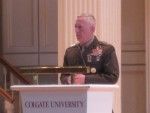Mattis Discusses National Security

On Thursday, March 25, some 250 students gathered in the Colgate Memorial Chapel to listen to an address by General James N. Mattis, a four-star general and Commander of U.S. Joint Forces Command. He is the intellectual force behind the United States’ Counterinsurgency Field Manual and is responsible for preparing the U.S. Military for the future of war. Mattis is a seasoned campaigner, having led combat units into three different wars.
Mattis’s lecture, titled “The Future of the National Security Environment: Opportunities and Challenges,” sounded more like a motivational speech than an analysis. Mattis, who was included the instructions “engage your brain before you engage your weapon” in his orders to Marines during the 2003 invasion of Iraq, focused a large portion of his speech on education. After all, in his experience, education was the most powerful weapon and the most feared force. According to Mattis, the Taliban kept women out of school for this reason.
“Once you expand the mind, it doesn’t go back to its original shape,” Mattis said in his speech.
At the same time, Mattis suggested that this was the most powerful weapon that America has in its arsenal.
“Train your character,” Mattis said. “Change your mind so that when things happen you can be critical and not be carried away by the latest demagogue on T.V.”
Part of education is realizing the importance of community. Mattis elaborated on this point, making the claim that to think egotistically is to be uneducated. As an example, he recounted Pericles’ definition of the word “idiot” as the man who follows only his idiosyncratic ways and the “citizen” as a man who acts mindful of the community. Mattis then argued that education is powerful because it shows us that we are part of a larger community and gives us a sense of our place in history. To take away that community, to believe that you are the only, or the newest, or the best, or independent of history is to become the idiot. The uneducated are easily lied to, Mattis argued.
“You can lie better to someone if they think everything starts with them,” Mattis said.
In terms of national politics, Mattis concluded this means that the United States cannot go it alone.
“I have never once fought without an ally,” says Mattis.
In his view, the U.S. cannot fight alone and the United States has recently become a little bit too quick to dismiss its allies.
“We [as a nation] need to restore a sense of listening to others,” Mattis said, arguing that this is necessary for the U.S. to become a better ally.
Another theme of Mattis’ speech was that of service. However, in addressing this, he did not take the familiar military line. In fact, Mattis expressed his belief that U.S. foreign policy is overly militarized, a powerful sentiment coming from a man in uniform with four silver stars glistening on his shoulder. Mattis encouraged the audience to join the Peace Corps, to get involved in diplomacy or to pursue economic opportunities that carry the softer elements of U.S. foreign policy.
“Service to something beyond yourself is critical,” Mattis reminded the audience.
Mattis’s speech contained a good deal of encouragement.
“This is your century,” Mattis said at multiple points. “We should never forget the magnitude of change that can be produced by small groups of people.”
Mattis also encouraged critical thinking in terms of politics. According to him, U.S. citizens need to decide if they want their primary representative abroad to be the military, or if they only want a military organized for
conventional warfare.
“We are owned by you,” said Mattis. “It is up to you what we do.”
The last major theme of Mattis’s speech was the prospect of tyranny. Mattis took a view of American ideals that stretches all the way back to the values of the enlightenment and the dignity of the individual. These values, Mattis argued, are under attack by people like Zarqawi, who believe that “Democracy is bad.”
The general spent more than half of his time here answering questions which ranged from concerns about whether that the U.S. had, in fact, caused the insurgencies which it’s now fighting to questions concerning the psychological treatment of home-coming soldiers and the ethics of unmanned aerial vehicles (UAVs).
“Someone who is willing to kill women and children? At a certain point, I don’t care what his politics are, I’m going to kill him,” Mattis said in response to the audience member’s concerns about the possibility that U.S.’ actions sparked insurgencies.
Mattis also raised interesting points concerning Post-Traumatic Stress Disorder (PTSD), criticizing societies’ “victim worship” and suggesting that to orient our society toward these people as ‘diseased’ individuals ignores the possibility of Positive Traumatic Growth. Some soldiers deal with loss by laughing, Mattis suggested.
“Laughter is armor for the soul,” Mattis said.
Mattis stayed afterward to talk to a group of students who gathered at the front of the Chapel to ask further questions, ignoring his aides’ impatience in order to answer the questions of all of the students who had gathered to talk to him.
Mattis was brought to campus by the Institute for Philosophy, Politics and Economics, Cushman House for Academics and Leadership and the Center for Freedom and Western Civilization.






